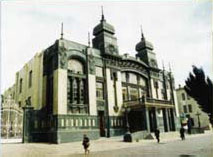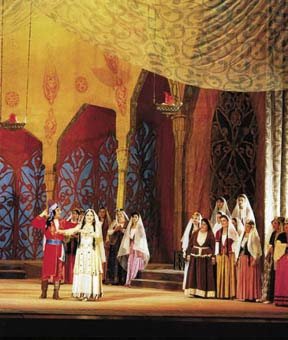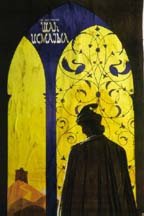|

Winter 1997 (5.4)
Pages
70-71
Opera in Azerbaijan
by Azer Rezayev
  Opera
in Azerbaijan is
basically a 20th century phenomenon which has incorporated elements
of Azerbaijani traditional music. The first opera performances
in Baku were staged at the old Taghiyev Theater, a building that
once stood on the site where the new Musical Comedy Theater is
presently being constructed. The new theater should open this
year-1998. Opera
in Azerbaijan is
basically a 20th century phenomenon which has incorporated elements
of Azerbaijani traditional music. The first opera performances
in Baku were staged at the old Taghiyev Theater, a building that
once stood on the site where the new Musical Comedy Theater is
presently being constructed. The new theater should open this
year-1998.
Photo: The Azerbaijan State Theater of Opera
and Ballet.
The Azerbaijan State Theater
of Opera and Ballet was built in 1910. The circumstances surrounding
its construction add to its intrigue and romance. It seems an
Italian diva came to Baku in 1909. Astonished to find that there
was no proper opera house where she could perform, she refused
to sing.
According to the story, "The
Bygone Days" written by Manaf Suleymanov, now in his mid-80s,
a certain oil baron by the name of Mailov fell in love with her
and offered to build an opera house in Baku if she would return
a year later.
  But could such an ornate building be
completed in a single year? Oil baron and philanthropist Haji
Zeynalabdin Taghiyev who had constructed numerous buildings in
Baku had his doubts. And so he challenged Mailov, betting him
that it could not be done. If Mailov succeeded within the deadline,
Taghiyev promised to underwrite the costs of construction. Ten
months later, Taghiyev had to shell out the money. The opera
house was ready. But could such an ornate building be
completed in a single year? Oil baron and philanthropist Haji
Zeynalabdin Taghiyev who had constructed numerous buildings in
Baku had his doubts. And so he challenged Mailov, betting him
that it could not be done. If Mailov succeeded within the deadline,
Taghiyev promised to underwrite the costs of construction. Ten
months later, Taghiyev had to shell out the money. The opera
house was ready.
Left: Scene from "Ashug Garib"
by Aulfugar Hajibeyov. Courtesy UNDP
Civil engineer and architect
N. G. Bayev, a graduate of the Institute of Civil Engineering
in St. Petersburg designed the building along the lines of the
Renaissance style architecture. The total costs for construction
exceeded 250,000 rubles (approximately $30,000) an enormous sum
of money for that period.
The Opera Theater which was
so vital to musical culture in Baku mysteriously burned down
in 1985. It's still not clear how the fire started. But the building
had become such a central landmark for music and culture that
officials decided to rebuild it. Three years later on January
3, 1988, the Opera Theater opened again. Today it stands as one
of the most beautiful and majestic symbols of cultural life in
Azerbaijan.
First Azeri Operas
Azerbaijan prides itself with having created the first opera
of the Middle East -"Leyli
and Majnun" (1908) by Uzeyir Hajibeyov (1885-1948),
which is based on the poetry of Nizami. It was Hajibeyov's first major work.
He was 22 at the time and admits that he really didn't have the
formal preparation to tackle an opera - music and libretto. Nevertheless,
it was Hajibeyov who opened the first page of Azerbaijan's national
opera history. He set the tone and direction of many works that
followed. For example, Hajibeyov led the battle to retain traditional
Azerbaijani modal forms, melodies and folk instruments. In the
early 1920s, there was a furious intellectual battle going on
between those who wanted to hold on to the traditional musical
expressions of the past and those who wanted totally to discard
them and embrace European music.
Hajibeyov was the genius who
took the best of blending eastern traditional elements (melody,
mode and instruments) with western style and form, specifically
opera, which was followed later on by other composers who wrote
works of symphonic, ballet, concerto and chamber music.
 |
Between 1908 to 1915, Uzeyir
wrote five more operas, one after another, making a total of
six during the pre-revolutionary period. In addition, he wrote
three musical comedies. After the Soviet power was established
(1920), his productivity slackened in terms of composing as he
was deeply involved with many administrative and pedagogical
tasks. Hajibeyov went on to write only one more opera - Koroglu
(The Blind Man's Son) in 1937. Fortunately, it was a
masterpiece.
Early singers of opera, remembered
for their masterful performances, include Bul-bul, Shovkat Mammadova,
H. Sarabski, H. Hajibabayev and M. Bagirov. Later others like
Sona Hajiyeva, Khurshud and Surayya Hajar, Hagigat Rezayeva and
Sona Mustafayeva followed.
Left: Program for "Shah
Ismayil" by Muslim Magomayev
|
After 1920, opera in Baku was spurred
on by the staging of several of the Western classics by Verdi,
Bizet, Puccini, Rossini, Glinka, Tchaikovsky and Mussorgsky.
Expanding Repertoire
The greatest developments in opera took place during the 1930s
when some of the most outstanding operas were written, including
"Shah Sanam" by Reinhold Gliere (1875-1956), "Nargiz"
by Muslim Magomayev (1885- 1937) and "Koroglu" by Hajibeyov.
Gliere, an eminent Russian composer
came to Baku because of his fascination with folk songs of the
Caucasus. He incorporated many Azerbaijani melodies into his
opera "Shah Sanam" (1934) in which Shovkat Mammadova
and Bul-bul performed the leading roles.
Koroglu
The year 1937 was a watershed in the history of opera in Azerbaijan
as it marked the first perfor-mance of Hajibeyov's
opera "Koroglu"(The Blind Man's Son) and Muslim
Magomayev's "Nargiz."
Koroglu was based on Azeri folk
music but it incorporated arias, recitatives, ensembles, a large
chorus and dances. Folk instruments, such as the tar (a stringed
instrument) and zurna (a wind instrument) were also written into
the score along with western symphonic instruments. The scenes
are dramatic. Even a horse-Koroglu's, of course-appears on stage.
Koroglu is based on an Azerbaijani
folk legend. The hero overthrows the khan who has been exploiting
the people. The plot is based on an Azeri folk legend but perfectly
suited the Soviet propaganda machine of the time. The music score
is extraordinary and hailed as Hajibeyov's masterpiece.
Three Troupes
When we speak about the Azerbaijan Opera Theater, it's important
to note a distinguishing characteristic about its performance
troupes. The opera collectives of Italy, England, America, Germany,
France and other countries usually consist of only one troupe,
meaning that all operas are performed in the native language
of that nation or are performed in the composers' native languages.
The same vocalists perform all of them. In other countries, the
opera collectives consist of two troupes-those performing in
the native language operas and those singing in languages of
the Western classics.
But in Azerbaijan, there are
three troupes. One troupe is comprised of mugam where the soloists
are mugam performers who sing in the Azeri language. The second
troupe consists of the soloists who perform the classic operas
of Azerbaijani composers in the Azeri language. The third troupe,
known as the Russian troupe, consists of soloists who perform
European classic operas, as well as operas by Russian composers.
During the Soviet period, most of the European classics were
translated into Russian; so, many of these operas are traditionally
performed in Russian instead of the original languages in which
the operas were written-German, French and Italian. In addition
to these three troupes, Azerbaijan has one single chorus and
an orchestra that go to make up the Azerbaijan opera collective.
The Azerbaijan Opera and Ballet
Theater troupe often toured throughout the former Soviet Union.
In 1941, they performed in Iran and later went on to make appearances
in France, Morocco and various Asian countries.
Looking Ahead
The opera is a powerful medium because it creates dramatic characters
that take on a life of their own. Lately, with the economic difficulties
that we have been experiencing since the collapse of the Soviet
Union, opera has had severe setbacks and been neglected. It is
critical that we don't lose what we have worked so hard to gain
and that our singers maintain the high professional level of
their previous performances. It's vital that we continue this
legacy of Azerbaijani opera and pass it to the next generation.
Somehow, we must find ways for the vibrancy of the opera to be
able to continue to live and breathe and sing.
Major Operas by Azerbaijani
Composers
1908 Leyli
and Majnun
1910 Husband & Wife*
1911 Mashadi Ibad*
1913 Arshin
Mal Alan*
1915 Ashug Garib
1919 Shah Ismayil
1935 Nargiz
1937 Koroglu
1945 Vatan
(Motherland)
1953 Sevil
1957 Azad
1960 Vagif
1972 Bridal Rock |
Uzeyir Hajibeyov
Uzeyir Hajibeyov
Uzeyir Hajibeyov
Uzeyir Hajibeyov
Zulfugar Hajibeyov
Muslim Magomayev
Muslim Magomayev
Uzeyir Hajibeyov
Gara Garayev & Jovdat Hajiyev
Fikrat Amirov
Jahangir Jahangirov
Ramiz Mustafayev
Shafiga Akhundova |
* music comedy operetta
Azer Rezayev, "People's
Artist," composer and professor, teaches at the Academy
of Music. He also is the Founding Director (1996) of the newly
established and magnificent Children's Philharmonic Orchestra
of the Bul Bul School.
Fuad Akhundov, history enthusiast,
also contributed to this article.
From
Azerbaijan
International
(5.4) Winter 1997
© Azerbaijan International 1997. All Rights Reserved.
Back to Index
AI 5.4 (Winter 1997)
AI Home |
Magazine
Choice
| Topics
| Store
| Contact
us
|



